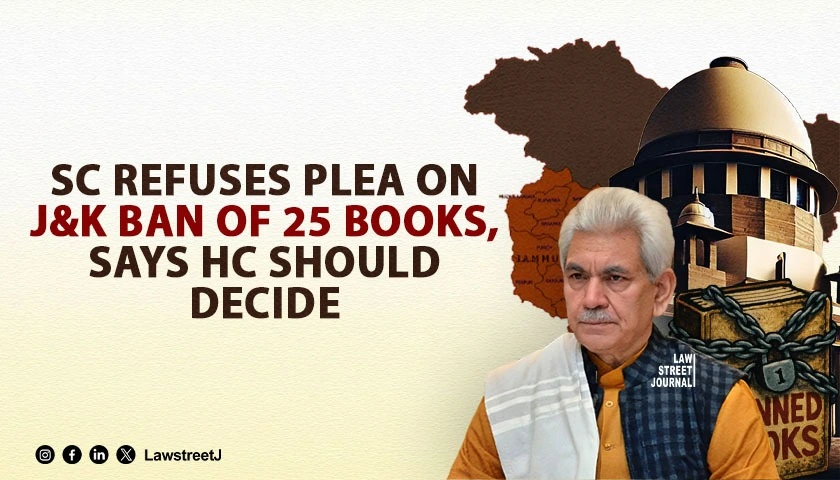NEW DELHI: The Supreme Court on Friday declined to entertain a PIL challenging a decision by the Jammu and Kashmir government, banning 25 books for allegedly propagating false narratives, promoting secessionism and glorifying terrorism.
Taking up a PIL by advocate Shakir Shabir, a bench of Justices Surya Kant, Joymalya Bagchi and Vipul M Pancholi asked the petitioner to move the Jammu and Kashmir and Ladakh High Court for the purpose. The court indicated it was not keen to entertain the matter.
"The High Court is a constitutional court, let it decide. Recently, there have been attempts to bypass High Courts. Let's have advantage of the HC's opinion. We have seen list of the books, some local people are talking about issues, the High Court would be in better position to decide," the bench said.
The court asked the Chief Justice of the High Court to list the matter before a three -judge bench, presided over by the CJ, and decide it at the earliest.
Senior advocate Sanjay Hegde, appearing for the petitioner, contended Section 98 of the Bharatiya Nagarik Suraksha Sanhita allowed even an official of a small state to decide one series of books as forfeited all over the country.
He said there have been cases from the Punjab and Haryana and other High Court but those were on individual books.
The petitioner challenged Section 98 of the Bharatiya Nagarik Suraksha Sanhita (BNSS), which deals with the power of a state government to declare certain publications forfeited and to issue search warrants on the ground that those were ultra vires Articles 14, 19(1)(a), 19(2) and 21 of the Constitution.
The bench, however, said the High Court would be in a better position to decide the issues, as some of the books forfeited were by locals of the area. The court also rejected a plea for transferring the matter to another High Court, saying it would have "demoralising" effect.
The list of banned books included by author Arundhati Roy, Pakistani historian Schofield and legal expert A G Noorani.
A notification issued by Principal Secretary Home, Chandraker Bharti on August 5, 2025 declared the books as forfeited to the government, invoking Sections 152, 196, and 197 of the Bharatiya Nyaya Sanhita, 2023.
The order stated these books, while often camouflaged as historical or political commentary, promoted a culture of grievance, victimhood and terrorist heroism.
It said that the texts “vilify security forces, distort historical facts, glorify terrorists and promote alienation” and hence contribute to radicalisation.
The government cited provisions under Section 98 of the Bhartiya Nyaya Sanhita 2023, along with Sections 152, 196, and 197 of the same code, to justify the forfeiture, claiming the content of the books poses a threat to the sovereignty and integrity of India.
The banned titles include academic, political, and personal accounts of the Kashmir conflict, such as "Human Rights Violations in Kashmir" by Piotr Balcerowicz and Agnieszka Kuszewska, "Colonizing Kashmir" by Hafsa Kanjwal, "Resisting Occupation in Kashmir" by Haley Duschinski and others, "Kashmir in Conflict" by Victoria Schofield, "Do You Remember Kunan Poshpora" by Essar Batool and others, "The Dismantled State" by Anuradha Bhasin, "Resisting Disappearnaces" by Ather Zia, "The Kashmir Dispute" by AG Noorani, "Independent Kashmir" by Christopher Snedden, and "Azadi" by Arundhati Roy.
Several prominent Indian and international publishers, including Penguin, Routledge, Oxford University Press, Stanford University Press, Zubaan Books, and Tulika Books.
Disclaimer: This content is produced and published by LawStreet Journal Media for informational purposes only and does not constitute legal advice. The views expressed are independent of any legal practice of the individuals involved.

















